
| www . ICEVI - Europe . org |  |
Volume 15 number 3, November 2009
On 13th and 14th October the newly composed Board of ICEVI-Europe held its first meeting at the beautiful Sabanci School in Istanbul, Turkey.
As usual the portfolios of the Board were allocated.
The 7th ICEVI Conference in Dublin, Ireland, was discussed in great detail.
The board members had received the evaluation report from the Host Committee.
Unfortunately the forms were filled out by only 36 of the 336 participants.
A number of participants were mainly attracted by the theme “Living in a changing Europe”.
Others used the conference mostly for networking.
The discussion amongst the board members provided a varied picture of the conference, which was also seen during the conference.
The conference went well; there were no significant problems, on the contrary. All sessions began on time and there were some excellent chairpersons.
A point of note for the next conference will be the theme.
In general the impression was that the theme had not been implemented sufficiently by many keynote speakers.
The allocation of supported places will be considered again.
The Board had not received a final report of the finances of the conference.
Concerning the costs of the conference, critical remarks were made. It was known that Ireland would be an expensive country for many participants.
Furthermore the economical crisis hindered the finding of sponsors.
The board of ICEVI-Europe thanked St Joseph’s again for organising the 7th conference and wished the management lots of success with all the building plans for the future.
During the conference the 7th General Assembly took place after the meetings of the delegates with their sub regions.
The results of these meetings you can read in this newsletter too.
In the meantime the board talked about the possibility of working through the items mentioned and in this way making a start with the programme for the next years.
The discussion about this will be continued during the next board meeting, which will be held 19 and 20 April 2010 in St Petersburg in Russia.
An important part of the meeting was the information and the discussion about the 8th European Conference.
The Host Committee, supported by the bureau Vista, had done a lot of preparations. Several venues were presented.
It was decided to hold the next conference in Istanbul in Kaya Ramada Hotel in July 2013. The members of the board visited the location on the second day of the meeting.
Finally the programme committee was designated for the next conference.
The following persons were chosen to be in the committee
In St Petersburg the committee will have its first meeting.
We almost approach the end of the year.
Therefore I gladly use the opportunity to wish you all happy holidays, and above all a good and healthy 2010, personally with family and friends, but also with your activities for the education and rehabilitation of people with visual impairment.
If my wishes will be fulfilled it will also be a good ICEVI year. We have a lot to do, conferences, Education for All children with Visual Impairment and so on.
This only can be accomplished together.
On behalf of the Board of ICEVI-Europe
Hans Welling,
Chairman
Many of you will remember the enthusiasm of our Irish colleagues, when they announced today’s conference in Chemnitz in 2005.
With the same enthusiasm, the programme committee, the scientific committee and the host committee have worked over the past years to prepare this conference, the seventh ICEVI conference in Europe.
At the beginning of the conference I would like to congratulate St. Joseph’s Centre for the Visually Impaired. Not only because you made great efforts to be the host of this conference, but also - and primarily - because this is the 150 year jubilee of St. Joseph’s.
St. Joseph’s is the only centre of its kind in the Republic of Ireland. The children, who attend, range in age from birth through to young adulthood. All have a visual impairment - some have additional disabilities.
The staff seek, through education, training and social care, to provide their students with the skills, knowledge, and confidence to fulfil their individual potential, so each can lead the life of his/her choice.
Currently the services of St. Joseph’s include:
I hope that St. Joseph’s will remain successful in offering its services to people with a visual impairment so they can live their lives as they see fit.
Ladies and gentlemen
Living in a changing Europe, this is the theme of our conference.
Social, economic and political conditions are changing very fast.
There is a clear tendency for governments to withdraw more and more and responsibilities have to be shouldered by individual members of society.
People with a disability are primarily responsible for their own lives, and also have the right to ask for support.
In this conference the changes in Europe and the meaning of this for people with a visual impairment and the professionals who work with them, will be the main issue.
As you know, in December 2006 the Convention on the Rights of Persons with Disabilities and its optional protocol has been accepted by the United Nations. So far, 58 countries have ratified the convention.
A milestone has been reached, because persons with disabilities are no longer viewed as objects of charity, medical treatment and social protection. Rather they are seen as “subjects” with rights, who are capable of claiming those rights and making decisions about their own lives, based on their free and informed consent as well as being active members of society. A great paradigm shift.
In a recent concept of the UNESCO Global Monitoring Report 2010 the switch from the medical model to the social model is described.
I quote
A disabled person is a person with impairment who experiences disability.
An impairment hence is an injury, illness, or congenital condition that causes or is likely to cause a loss or difference of physiological or psychological function and a disability is defined by the loss or limitation of opportunities to take part in society on an equal level with others due to social and environmental barriers.
There is no agreed intentional definition of disability. In the past disability has been classified within a “medical model” of clinical diagnosis, treatment and rehabilitation. More recently disability has been looked at with a public health focus whereby there is a shift from individual rehabilitation to a broader framework of focusing on risk reduction, functioning and accommodation needs of people with disabilities in order to participate fully in society. This model recognises the responsibility of society, policies and institutions to counter the causes of marginalisation of disabled people. This in turn leads to fundamentally different policy priorities and choices, mainly around the removal of disabling barriers, as well as a strong emphasis on human and civil rights.
Within the social model, PwD are regarded as disadvantaged not because of their impairments, but as a result of the limitations imposed on them by social, cultural, economic, and environmental barriers. Disability according to this formulation is not about health or pathology but about discrimination and social exclusion. From a social-model perspective disability is a socio-political issue. This in turn leads to fundamentally different policy, priorities and choices, mainly around the removal of disabling barriers, as well as a strong emphasis on human and civil rights. This model was developed and is mainly applied in the context of “developed” countries where functioning public institutions and a rights-based approach to policy are the norm.
Such an approach is reflected in the WHO International Classification of Functioning, Disabilities and Health (ICF) which conceptualises disability as a product of the interaction of a person with a health condition with the environment, manifested in the dimension of body functions, performance and activities and participation. This social model of disability has in a related way emphasised the fact that disability resides not in the individual but in a social construction about limitations, as much rooted in cultural, social, political, legal and economic factors as in biology. In other words people with disabilities are disabled not so much because of their functioning limitations but because they are denied access to education, labour markets etc
Every country uses its own definition of disability. Policies for disabled people are strongly determined by their underlying understanding of disability. In a “medical model” disability is regarded as the problem of an individual arising form his or her functional limitations. Therefore the primary focus in countries using such an approach is on providing people with disabilities with various aids and appliances, immunisation, etc, that can help them function like others, rather than addressing social barriers that result in their exclusion or non-participation from the mainstream. In such contexts, efforts to develop educational programmes for disabled children often are organised apart from the regular education system”.
It is of great importance to realise this paradigm shift, because it also concerns the question of which role we as professionals and professional organisations play, so that parents together with their children, and also adults and elderly people with disabilities can follow their own path.
Within Europe many people dedicate themselves to improving the quality of life of people with a visual impairment. Wonderful!
At the same time we can see how difficult things sometimes are. Not only because materials are insufficient; this is hardly ever the cause.
Sometimes professionals and professional organisations do not show enough professional flexibility when facing a redefinition of their roles.
Ladies and Gentlemen
ICEVI exists to provide educational and rehabilitation opportunities for children, adults and elderly people with visual impairment.
This means those people who are totally blind or who have low vision, including those with additional disabilities, such as cognitive, hearing, behaviour, physical or other disabilities.
I am happy that during this conference we have special interest groups paying attention to the total target group of ICEVI.
The role of ICEVI is to:
For the coming period this means in the first place
Furthermore ICEVI is cooperating with 5 European Universities to start a European Masters for those who are working in the field of education and rehabilitation of people with a visual impairment. A tremendous challenge!
The programme of ICEVI can only be implemented in cooperation with its members.
I trust that the programme can also be realised in cooperation with the network MDVI and Enviter and our colleagues from the European Blind Union.
There is a lot to be done. The board is convinced that the regional meetings tomorrow will supply input for the coming years.
Now back to this conference.
I close with the words of Tomaso Daniele, president of the Italian Disability Forum and of the Italian Union of the Blind and Particially Sighted: ” the time has come now to put words into deeds and to take concrete action so as to consolidate the fundamental rights of persons with disabilities”.
I wish you an inspiring conference that invites you to reflect on your work as a professional.
Hans Welling
Dublin July 2009
Eberhard Fuchs presented the budget and indicated that the full figures can be found on the website. The figures were accepted.
Hans Welling was proposed as the continuing chairman
Accepted
Dieter Feser (Germany) and Ana Isabel Ruiz López (Spain) presented themselves as new candidates.
Accepted
All other board members were proposed and accepted
Contact persons were proposed and accepted
22 persons participated in the meeting and the discussion on future focus areas was intensive. We ended up with these issues for ICEVI-Europe to work with for the next 4 years.
Representatives from all countries were present except Albania, Cyprus, and FYROM at the regional meeting.
We discussed the outcome of the 2 Balkan Conferences that we held in Belgrade and in Istanbul and every one of the representatives proposed a subject for discussion for the next events.
The next Balkan conference is going to be in Croatia in Zagreb in October 2010. I am planning to visit them on November 10-12 so we will start preparing the event.
We still haven’t found a contact person for Albania and for Bosnia & Herzegovina so I will e-mail the associations of the blind to propose someone who fulfils the criteria.
At the meeting we decided to have a link on the ICEVI – Europe web page, with news from the Balkan Countries (projects, new services new schools, sharing information good practices etc.) Each contact person by rotation will be responsible. This service will officially start in January with Maria Kyriakou being the first contact person who is going to collect all the news.
In the regional meeting of the German and Dutch speaking countries, the following topics have been discussed:
Furthermore a working group is to be formed in order to consider elderly persons. Karsten Hohler has agreed to take the initiative.
Seven participants were present at the sub regional meeting and three main subjects were discussed:
Someone suggested the organisation every year of a meeting, as in 2007 in Angers, for French speaking countries. But many others think that it’s not realistic to propose another meeting because of the multiplicity of meetings from different associations: “We have no more time and money to go everywhere”.
The final suggestion was to have a meeting coupled with an annual meeting of GPEAA in Paris for example.
The question was how to motivate contact persons and to give them more responsibilities to enrich the network of ICEVI?
One suggestion was to specially invite them to a European committee meeting of the board…but the price was also a problem.
We discussed what kind of information is interesting to give to the representative on the board: conferences, new projects, research
But who can manage it? And do people enter into this type of forum (it needs much time and regular use)? Transmissions by mail seem to be more efficient if everybody answers and tries to give information to the others. Our objective is to extend our network, to diffuse more information about ICEVI.
Some themes were also suggested for organising a meeting in the year 2010.
In the South European regional meeting there were only three persons, the two Spanish contact persons and someone who came on behalf of the contact person in Portugal.
Due to the current economic conditions and the lack of participation in our countries, mainly because of language difficulties, we made an action plan aimed to catch the attention of professionals in our countries and distribute information within the sub region.
We ask ICEVI to help us in this action plan by creating a place on the ICEVI-EUROPE website for each sub region to allow us to communicate between members, share information.
Contact persons are:
ICEVI members:
Association for Early Intervention – Terezie Hradilková, Jana Vachulová, Markéta Skalická
Poland – Boguslaw Marek
Non members:
Representatives of Palackého University Olomouc, department of special education
Hungary – nobody
Slovenia – nobody
Slovakia – nobody
The Dublin conference was inaccessible for people from Central Europe.
Networking in the frame of the Central European region is very weak.
It is necessary to solve the work of contact persons.
The potential of ICEVI is still quite huge, but it is necessary to engage people, to open them up to the possibilities and how to be an active member.
At our regional meeting, where we had representatives from all the areas within the English speaking regions, we discussed firstly what have been the significant events in our region in the last few years.
Here are just a few:
We further discussed what we would like ICEVI to be doing that we can contribute to. Suggestions were to:
Turkey (Turkan Sabanci school for the visually impaired in Istanbul) made a presentation and put themselves forward as possible candidates to host the next ICEVI Europe conference.
November 2009
Mary B. Lee

In the period 1 – 3 October 2009, in Chisinau, the capital of the Republic of Moldova, there took place the second International Conference on the theme of the East European and Asian regional project „XXI Century – All over open society century”, with the topic „Low vision – theory and practice”. (www.upsc.md/icevi_conf_2009)
The organisers of the conference are the State Pedagogical University „Ion Creanga” (www.upsc.md) in partnership with the Blind Union of Moldova, (dcsom@mtc.md) and ICEVI (International Council for Education for People with Visual Impairment) (www.icevi-europe.org) with the financial support of Soros Moldova (www.soros.md).
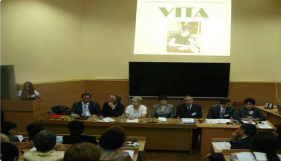
The conference was held on the basic objective of access to information and increasing the degree of social participation and inclusion for people with visual impairment, by assuring them the right to see, by preventing blindness and by providing periodical activities for sight maintenance.
Over 100 scientists and practitioners from different universities’ scientific centres such as: Netherlands, Romania, Russia, Ukraine, Kazakhstan, Azerbaijan, and Moldova, participated in the conference
The main aim of the regional project is to create a structured contact network in the field of education and rehabilitation for visually impaired people within the East European and Asian region.
The focus of this project is on improving the quality of life and raising the level of education and rehabilitation services provided, for children, students and adults with visual impairment.
The objectives of the 2nd International Conference were the following: coordination of the teachers’ training process in the field of education and rehabilitation of visually impaired people, exchange of experience among the network partners, elaboration of special conditions for practical activities concerning services for visually impaired children, implementation of various common projects, programmes and partnerships.
The keynote speakers were the specialists from the Netherlands’ University of Utrecht, Theo Blom and Karel de Vries organised a whole day workshop on the topic of education for partially sighted people for all the participants at the conference.
On the 3rd of October the participants at the conference were invited to the National Artistic concert of children with multiple disabilities held by „VITA” Association. Also on this day there took place an exhibition of handicraft by partially sighted masters.
Presented by
Larisa Celan, vice president of BUM
Igor Racu, PhD, university professor.

Saturday, 19 September 2009, Novi Sad
The field of Early Intervention has highly developed programmes and cooperation in Europe. We wish to follow the professional issues and matters and to receive more professional knowlege from colleagues from other more developed countries in Europe. The conference was held with support and a reference from Mr Hans Welling, ICEVI- Europe, and Mr Dennis Lolli from Perkins International, the Association of the Blind of Serbia, the town of Novi Sad and The Association of Special Educators of Serbia.
The goal of this conference was to share experience with International professionals from the Czech Republic, Bulgaria and Croatia and to present our own work. It is very important to draw the attention of all professionals in special education and learn more about children with multiple disabilities and their needs in Early intervention. The conference took place on the 19th September in Milan Petrovic School Novi Sad. There were 80 participants, including professionals from Czech Republic, Croatia, Macedonia, Bosnia and Herzegovina and of course Serbia. Our speakers demonstrated a variety of knowledge and skills in the field of Early Intervention and had a great opportunity to share their experience. The papers included medical, pedagogical and social approaches in Early Intervention and interdisciplinary cooperation. This means that special educators involved in the field of visual impairment, hearing impairment, motor and physical disabilities, cognitive delay and multiple disabilities presented their work to each other.
Mrs Terezie Hradilkova, Vice- president of ICEVI- Europe was our honoured guest and her experience in the field of Early intervention gave everyone an opportunity to compare their own approach in work, professionalism, skills and competencies. The colleagues from SUVAG polyclinic, Zagreb demonstrated The verbo-tonal method as a highly developed approach in rehabilitation of young children with hearing impairment. Mala Kuca, Zagreb, once again proved their competencies and hard work with children with multiple disabilities. The presentations by Snjezana Seitz and Tatjana Petrovic-Sladetic on the programmess of “Mala Kuca” and their skills in the field of assessment of functional vision of the visually impaired and children with multiple disabilities impressed everyone in the audience. In Serbia and the region, we don’t have any skills or tools to do this part of intervention.
We hope that this was only the beginning of further cooperation and that special educators from Serbia, Macedonia, Montenegro and Bosnia and Herzegovina will have many more opportunities to share, learn and develop their competencies in the field of Early intervention in the future.
The papers from the programme will be provided online at www.ok.servisimp.org from October 1st 2009.
By Jelena Mazurkievic, Serbia
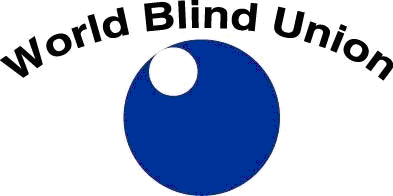
OCTOBER 15, 2009
The ability to travel safely and independently is a critical issue to everyone in our society. We all want to get to our destinations in the safest and quickest way possible. This is no different for persons who are blind or partially sighted. While new technologies are emerging that harness global positioning systems linked to speech enabled mobile phones to enable navigation of foreign cities, such technology is not universally suitable, available, or affordable, and for most blind and partially sighted people the white cane remains the essential mobility aid.
The white cane is also acknowledged as a symbol representing blindness and mobility and is used by blind and partially sighted people across the world. Guide dogs are also used in some countries.
As we celebrate White Cane Day on October 15th, the World Bind Union, representing some 160 Million blind and partially sighted people worldwide, is concerned that some present day innovations are threatening the safe and independent travel of blind and partially sighted people.
Acoustic information is a primary tool for orientation by blind and partially sighted people, for example, to determine when traffic has actually stopped – rather than when it has been signalled to stop. And when crossing at an intersection that has no traffic lights, they listen for oncoming traffic to determine when to cross.
All that relies on being able to hear the vehicles but in recent years “hybrid/quiet vehicles” have become more commonplace. By the time a blind person (or anyone) has heard the quieter engines of these vehicles, there is simply not sufficient time to safely cross the street.
We recognize the need to develop more environmentally friendly vehicles and we would not wish to stifle such innovation. However, it is essential that vehicle manufacturers design some kind of sound into these vehicles to ensure the safe and independent travel of blind persons. The technology exists to make sounds that adjust to ambient noise level unnecessary noise pollution can be avoided.
Another challenge relates to a new urban design concept that is being applied in many countries, namely “shared space”. The aim is to create more pedestrian friendly, civilized streets with less traffic and lower speeds. However, the concept is most commonly delivered by means of a “shared surface” where kerbs are absent and pedestrian and trafficked areas are at the same level. Priority in crossing the space is negotiated by making “eye contact”.
This undermines the mobility of blind and partially sighted people in two ways: first, blind and partially sighted people rely on the kerb as an essential clue for navigation and orientation; and second, “eye contact” is quite clearly impossible for someone with sight loss.
In the 21st century we should be creating town and streetscapes that can be used by everyone in our society and which reflect the principles of inclusive which are called for in the United Nations Convention on the Rights of Persons with Disabilities.
The World Blind Union calls upon governments, regulators, designers and manufacturers to establish and implement standards that will ensure universal access for all persons with disabilities. We further call upon designers and manufacturers to consult with the World Blind Union, our members and partners in order to discuss possible implications of proposed design change so that issues which may be identified can be dealt with in the early stages. In this way, our environment can enable safe an independent travel for everyone including those who are blind or partially sighted.
For further information contact:
World Blind Union
Penny Hartin, Chief Executive Officer
1929 Bayview Avenue Toronto Ontario Canada M4G 3E8
Tel: 1-416-486-9698
Fax: 1-416-486-8107
E-mail: Penny.hartin@wbuoffice.org, info@wbuoffice.org
Web: www.worldblindunion.org
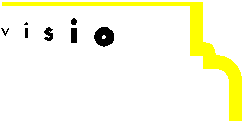
Huizen, [date] - Royal Visio, National Foundation for the Visually Impaired and Blind, has increased the chances for a select group of visually impaired people to obtain their driving licence. By using a bioptic telescope system and corresponding intensive visual training, Visio enables candidates to pay due care and attention in traffic. An eye disorder can result in failure to meet the statutory requirements for driving a car. Scientific research shows that a bioptic telescope system can lead to a decisive improvement in the practical fitness to drive. Visio and its collaborative partners, Groningen University Medical Centre (UMCG) and the Central Bureau of Driving Skills Certificates (CBR) are enthusiastic about the legislative change: the requirements for passing the driving test have not changed, yet the telescope has been admitted to the list of permitted visual aids.
The bioptic telescope system is a small telescope of low value magnification fitted in the left or right spectacle glass. It enables the user to instantly assess the traffic situation ahead and to clearly see the road signs. Use of the telescope is allowed in traffic in the majority of US states, with over 4000 drivers currently using a similar aid. Driving independently and safely is an important part of independency. Visio understands the importance thereof for people with a visual impairment and has been the initiator of the project to use the bioptic telescope system as a visual aid allowed in Dutch traffic. An intensive training course on the use of the telescope and driving lessons form part of the rehabilitation programme. Scientific research by Visio, UMCG and CBR shows that some of the participants can use this to drive a car in Dutch traffic safely.
When an individual no longer meets the statutory requirements for driving a car, the ophthalmologist can refer the potential candidate to Visio. Here an intake interview, a visual test and a (neuro-)psychological test will be held. The medical details held on record by the own ophthalmologist are also required. If the candidate meets the requirements, Visio will customise a bioptic telescope system for the user and train the individual in using the device in practice safely. Visio developed these training courses in conjunction with the CBR and UMCG. Following driving lessons with specialist driving instructors immediately thereafter, the CBR will hold an official fitness te drive test on the basis of the general requirements. Candidates must demonstrate that they can drive safely with the device.
For further information, please visit www.auto-mobiliteit.org
Anyone with questions on being visually impaired or blind can contact Visio. Visio offers information and advice as well as different types of tests, guidance, rehabilitation, training and housing. These services are offered to people who are visually impaired or blind, whether or not in combination with a mental, physical or other sensory impairment. Those who are personally and professionally involved can contact Visio for information and promoting expertise. As from 1 January 2010, Visio, Sensis and De Brink will merge into a single organisation, the Royal Visio expertise centre for the visually impaired and blind. For further information, please visit www.visio.org.
Article by Anca DAVID
I was quite surprised that during ICEVI’s 7th European Conference held in Dublin, last July, there was no mention about the existence and the benefits of non-formal education for young visually impaired persons.
Non-formal education, according to the Youth in Action Programme Guide, refers to the learning which takes place outside the formal educational curriculum. Non-formal learning activities involve people on a voluntary basis and are carefully planned, to foster the participants’ personal and social development. Non-formal learning enables young people to acquire essential competences and contributes to their personal development, social inclusion and active citizenship, thereby improving their employment prospects.
A non profit organisation, VIEWS International, located in Liège, Belgium, promotes non-formal education for visually impaired persons, between 18 and 30 years old, through its current activities. VIEWS International is aiming: to encourage encounters between blind and partially sighted young Europeans with the aim of developing a mind for solidarity and democracy that is specific to the European culture and to facilitate contacts between professionals working in all areas associated with visual impairment: scientific and technical research, culture, sports.
VIEWS International is a network of 15 European countries working on different projects. VIEWS International is both a team of parents, professionals, academics, all concerned by visual impairment and/or experts in the field as well as a team of young European visually impaired or sighted, who get passionately involved in a number of projects within the association.
VIEWS International is using mainly the framework of the Youth in Action Programme of the European Commission, in order to propose activities like youth exchanges, European Voluntary Services, trainings or seminars for young visually impaired persons.
One of the activities that have the greatest impact on young visually impaired persons, are the youth exchanges. Since 2004, VIEWS International has supported one of its organisation members or informal groups of young persons to organise international youth exchanges.
A youth exchange, according to the Youth in Action Programme is a project which brings together groups of young people from two or several countries, providing them with an opportunity to discuss and confront various themes, whilst learning about each other’s countries and cultures.
For example, in the summer of 2008, VIEWS has organised a youth exchange with 7 different European countries on the theme of art and body expression. During 10 days young people, both visually impaired and sighted, from Bulgaria, France, Italy, Latvia, Romania, Poland and Belgium experienced adapted activities like: sculpture, dancing, singing, theatre, photography, piano, sport, T-shirt painting, playing African drums or visiting adapted museums like the Musical Museum in Brussels.
Two of the participants at this youth exchange, gave their feed-back on their experience: Magda from Poland said “This exchange was a very good experience for me. I met fascinating and valuable people… This experience motivated me to learn new languages...” and Boyan from Bulgaria: “To me it was a great experience I will remember it my whole life. During the exchange I met a lot of new cool people and a few guys I knew from before and I am completely sure that we’ll manage to become good friends through keeping in touch… Thank you all for everything that you gave me as emotions and your personal appearance! Once again, I miss you all very much and hopefully we’ll keep in contact! ”.
Youth exchanges involve the active participation of visually impaired young persons and are designed to allow them to discover and become aware of different social and cultural realities, to learn from each other and reinforce their feeling of being European citizens.
As President of Ireland, Mary McAleese, encouraged us to do during her speech at the 7th ICEVI’s European Conference, this article represents another piece of the puzzle that is the world of people/institutions that are developing activities with and for visual impaired persons. Other pieces on activities in a non-formal environment with VIEWS International will soon follow.
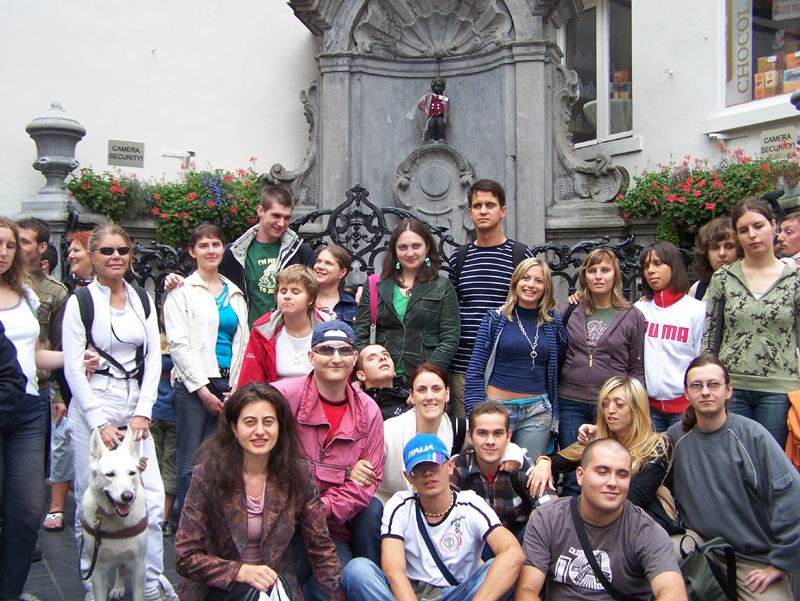
Hans Schuman, PhD: Worked as a teacher in a special school for students with a visual impairment in the Netherlands. Conducted research on the impact of a visual impairment on family relationships and personal well being, the struggle for inclusion and giving students with learning disabilities a voice.
This book presents a critical review of a five year research project which aimed at developing an empowering curriculum for visually impaired teenagers with learning difficulties. Based on a growing body of literature, four approaches were identified to support the educational practitioners to evolve into change agents who assume collective responsibility and ownership for the change process: the ideas of the learning organization, the social model of disability, McClelland’s model of the iceberg, and making use of a discussion technique called intervision. Participatory action research, with its focus on emancipation through collective, informed and democratic action, provided the necessary framework to integrate these four approaches and to inform, underpin and guide the change process.
An important conclusion is that teenage students with challenging multiple disabilities and learning difficulties are capable, when they are allowed, challenged and taught, of advocating for themselves, developing clear views about how they want to live, manage their lives and make informed decisions which best fit their personal needs and objectives.
visual impairment, learning difficulties, curriculum development, school improvement, empowerment, ownership, participatory action research, systems thinking, organizational learning, inclusion
The education of visually impaired teenagers with learning difficulties and their exclusion from mainstream schools
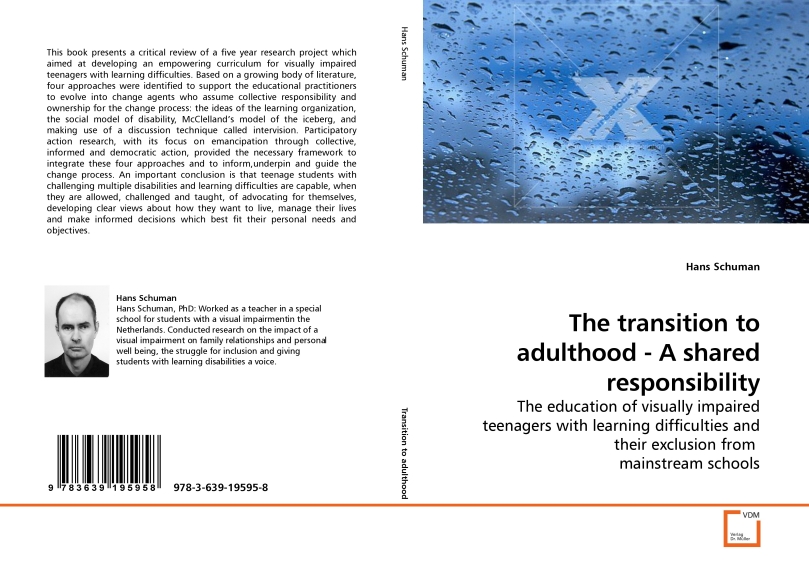

to be held on 16-18 April 2010 in Kyrenia, North Cyprus has started accepting abstracts for papers, posters, workshops and other means of presentations. Scientific scope of the conference is going to contain the following topics;
All abstracts will be published in the conference program & abstract book. All papers will be published in the conference proceedings book. Selected papers will be published in high standart scientific journals (SSCI)
Abstracts must be submitted by email to registration@icose2010.org
Please visit www.icose2010.org/submission.html for rules & regulations about preparing your abstracts.
Please visit www.icose2010.org/registration.html for more information
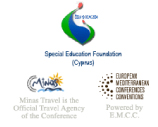
For questions about technical and organizational matters
e-mail: info@icose2010.org
Tel: +90.392.224 13 03
For abstract and paper submissions, registrations and other academic/scientific enquiries
e-mail: registration@icose2010.org
Tel: +90.392.224 13 04
For travel, accommodation and other related questions
travel@icose2010.org
Tel: +90.392.224 13 05
www.icose2010.org
We are very pleased to announce that the third ECPVI conference will take place in Vilnius, Lithuania on the 30th and 31st of March 2010. The number of participants is limited to 120.
The plenary program will consists of a number of keynote speakers from the University of Vilnius and the Lithuanian Association of the Blind and Visually Handicapped, among others.
The sessions on day one will cover different age groups:
The sessions on day two will cover topics like:
We would very much encourage the participants to share their work at this conference. It could be in the shape of presentation of new ideas, research findings, showing assessments, giving lectures or just asking for partners in new projects.
If you want to do this, please send a short “abstract” on the idea and the theme. The overall meaning for the conference is to exchange and reflect upon psychology and visual impairment. So do not send a formal abstract like the more formal conferences, but just as a piece of information, so the planners can get an idea of what you want present.
The host of the conference will be the Lithuanian Training Centre for the Blind and Visually Impaired in corporation with ICEVI-Europe. An associated partner will be Lithuanian Association of the Blind and Visually Handicapped.
The conference is “low budget”. This means there is no conference fee but just a fee for food and drink will be required (the amount will be announced later).
You arrange your own travel and book a hotel yourself.
The conference language will be English.
On the evening of the 29th of March, a local pub in Vilnius will be picked for casual meeting.
On the evening of the 30th of March, there will be a dinner at the trainingcentre.
The dealine for “abstracts” is 1st of December 2009.
The deadline for registration is 1st of February 2010.
The contact person and the person to whom you send your information is:
Ingrida Gabrialaviciute, ingrida@lasuc.lt
http://www.synsraad.dk/psychology/index.asp
The Third International Conference in the frame of the East European and Asian regional project “XXI Century – All over Open society Century” with the theme Visual Profile will take place at the Pedagogical State University in Perm, Russia in March 2010
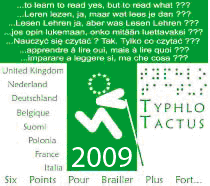
Open to all countries in the world.
In November 2011 the Tactus Competition for the Award for the best tactile book for blind and visually impaired children will take place.
The members of the Tactus group invite you to create your own tactile illustrated book with Braille.
More details and information about Tactus & Typhlo will follow in the next issue of the ICEVI newsletter.
This is a very exciting opportunity for the right candidate to work and assist with the development of the Visual Impairment curriculum within government schools in the Middle East.
This is a permanent position to be based in the UAE, with an excellent salary (tax free) and accommodation.
If you are interested in this opportunity, please send your CV to cgentles@cobaltrecruitment.com.
In response to our message to the editor, Denise McCarthy of Linn's Stamp Newsletter, about stamps that had or will be issued this year to celebrate the 200th Anniversary of the Birth of Louis Braille there developed a correspondence between us about these issues. We were happy today to open the March issue of the newsletter and read (click on to) "Many stamps honor Braille birth bicentenary".
We are delighted that in this year that marks the bicentenary of three great liberators.
"In the first few weeks of 1809, three baby boys were born who changed the course of history;From "Louis Braille - A touch of Genius" by C. Michael Mellor, 2006
Although Louis Braille is still little known, except by blind, we are thrilled that, as of today 29 countries will honor him and his system with stamps during 2009. Stamps journals, newspapers and major information networks, including the British Broadcasting Corp. (BBC) have included him in their publication and broadcasts.
Ken & Gunilla Stuckey
Read more from Linn's Stamp Newsletter
Hi All,
There is a new website that has been established specifically to meet the needs of the visually impaired. If you need any help, information or support then this is where you can find it.
If you answer yes to any of the following:
Then this site is for you.
If you or anyone you know is visually impaired then this website could help you.
Visit us at www.partially-sighted.com for free access to the discussion forums set up especially for the visually impaired, to encourage the sharing of useful information, experiences or simply to offer each other advice and support.
Feel free to socialise, network or search out those who have similar experiences or conditions to yourself. You could also try and find people or groups already established in your area, or set up a new group.
I would be grateful if you could forward this link/message onto anyone who you think may find it useful.
Many thanks
All at www.partially-sighted.com